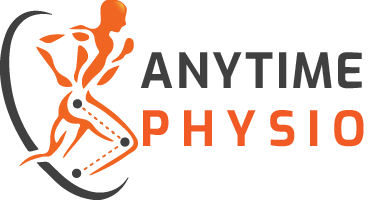FREQUENTLY
ASKED
QUESTIONS
Do you have any questions about Anytime Physio?
Your first appointment is where we conduct a comprehensive assessment and develop a clear understanding of your health. We also assess your injury and movement capabilities.
Your physio will need to look at your injury, so wear comfortable clothing and bring any relevant medical assessments to your first appointment. Once we have all the necessary information, your physio will tailor a specific treatment plan to get you started on
Yes, we accept Medicare Chronic Disease Management (CDM) Plans, though these will require a valid GP Management Plan or Team Care Arrangement from your Doctor.
Our standard rates are payable at the time of your appointment. Your eligible debit card processes your rebate.
Yes. We accept WorkCover or Worker’s Compensation claims. We require that you provide a valid, up-to-date copy of your WorkCover medical certificate. The medical certificate must clearly state that you need physiotherapy as a treatment.
Our standard rates are payable at the time of your appointment. You can claim your rebate through WorkCover by submitting your invoice through the WorkCover app.
Fitness Pilates classes are typically run by fitness instructors who have done a short course on Pilates. Clinical Pilates, on the other hand, is used by qualified Physiotherapists who have gone on to complete extensive training in mat and Reformer Pilates.
At Anytime Physio, our Physiotherapists who are also qualified Clinical Pilates Instructors run our private and group Pilates classes.
Dry needling involves the use of ‘dry’ (i.e. non-medicated) fine filament needles for the treatment of a wide range of painful musculoskeletal conditions and sports injuries.
Needling aims to address pain and dysfunction in the soft tissue to provide pain relief and restore function. These dysfunctions often present as tight muscles or ‘muscle knots’. Common injuries treated by dry needling include low back pain, neck pain, whiplash, shoulder pain, elbow pain, knee pain and ankle sprains.
At Anytime Physio, our physiotherapists have undergone extra training after their University degrees to become qualified and proficient at dry needling. We offer dry needling as part of our physiotherapy services.
Dry needling is very safe when performed by a qualified therapist. Our therapists always explain the risks associated with any treatment before your session.
A recent study investigating over 7500 sessions found that only 3% resulted in pain during the treatment and only 2% resulted in pain after.
The best treatment for wrist, hand and finger pain will depend on the type of injury and the reason for the pain. Our physiotherapists start with a thorough assessment to rule out any red flags. From there, they perform a series of tests to help diagnose your condition.
As an example: if you strained your flexor tendon while rock climbing, treatment will most likely consist of soft tissue massage for swelling, gentle exercises to slide and glide the flexor tendon, and ice to manage the swell.
The best treatment method depends on the diagnosis. Mostly, we manage sprains and strains with a combination of taping or bracing, soft tissue massage, ice for swelling and some gentle range of motion exercises.
As treatment progresses, your physiotherapist will guide you through a series of flexibility and balance exercises to help you get your ankle ready for running and sport.
Lower back pain is the most common presenting condition in our clinic. In the early stages, our physio treatment for low back pain involves the manual hands-on treatment, including manual therapy, dry needling and soft tissue massage.
Your physiotherapist then prescribes therapeutic stretches and exercises to help support the lower back and prevent a recurrence. We also use clinical Reformer Pilates to assist recovery from acute and chronic low back pain.
Neck pain is one of the most common conditions treated in our clinic. Early physio treatment for neck pain involves manual hands-on treatment. This includes manual therapy, dry needling, and soft tissue massage to provide pain relief. Your physiotherapist then prescribes therapeutic stretches and exercises for the deep cervical muscles to help support the joints of the neck to prevent a recurrence.
Your physio begins by conducting a subjective assessment and physical examination of your elbow and forearm. This is followed by a manual assessment on the area of pain to look for tenderness.
For the two most common conditions (tennis elbow and golfer’s elbow), we use the latest evidence-based treatment methods for managing elbow pain. A tried and tested strengthening and stretching program is designed to improve the load-bearing tolerance of the tendons causing pain. Your physio will also offer you tape or brace options to help support your elbow and reduce pain during recovery.
For other elbow pain conditions, management typically consists of soft tissue massage and manual therapy, bracing to support the elbow, and exercises to improve strength in the affected tissue.
WE ARE HERE TO HELP
Send Us A Message
ANYTIME PHYSIO GASWORKS
Ph: 07 3733 0944
Fax: 07 3319 6944
Email: info@anytimephysio.com.au
Shop B6 Gasworks Plaza
76 Skyring Terrace
Newstead QLD 4006
